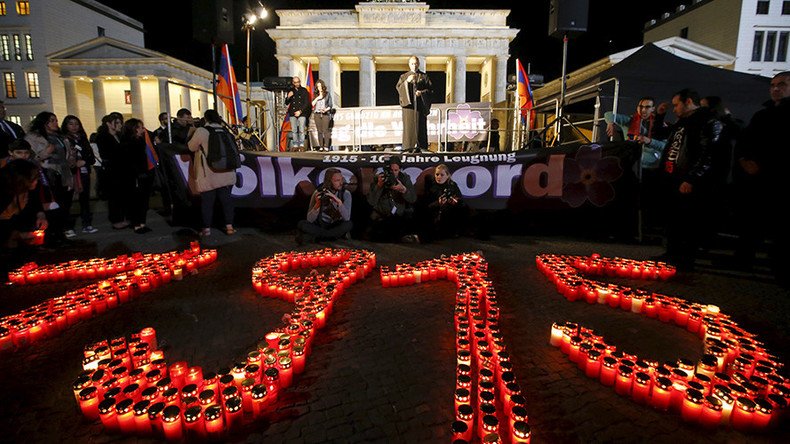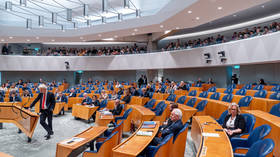Germany says Armenia genocide resolution ‘non-binding’ after reports Berlin keen to ‘satisfy’ Turkey

Germany’s foreign minister has said the Bundestag resolution recognizing the 1915 massacre of Armenians in the Ottoman Empire as genocide is “non-binding,” following media reports the German cabinet would disavow the resolution so as to continue using Turkey’s Incirlik airbase.
"The German parliament naturally has the right and the freedom to pass any resolution it likes, but the Bundestag itself has said that not every resolution is legally binding," Foreign Minister Frank-Walter Steinmeier was quoted by Reuters as saying on Friday.
FM #Steinmeier: conciliatory gesture towards Turkey on #armeniangenocidepic.twitter.com/veaqDfJpLC
— DW | Politics (@dw_politics) 2 сентября 2016 г.
Earlier in the day, Spiegel said in an unsourced report that the Foreign Ministry and the Chancellery are likely to give cabinet spokesman Steffen Seibert the green light to make a public statement distancing the government from the resolution.
"There can be no talk of the German government distancing itself from the Armenia resolution," Seibert told reporters at a planned news conference shortly after the magazine broke the news. He also said the resolution is not legally binding.
The resolution, adopted by German MPs on June 2, formally calls the 1915 massacre of ethnic Armenians by the Ottoman Turkish forces “genocide.” The vote was almost unanimous, and was met with delight by Armenian communities worldwide.
BREAKING: German parliament acknowledges Armenian genocide amid intense Turkish pressure https://t.co/fqZNFA4dH2pic.twitter.com/JocDqMgXsr
— RT (@RT_com) 2 июня 2016 г.
Ankara responded with a threat of retaliatory measures and denied German MPs access to Incirlik Airbase, used by Germany for the US-led campaign against the Islamic State (IS, formerly ISIS/ISIL).
In June, the Bundeswehr, Germany’s military, was seeking an alternative airbase in Cyprus or Jordan, while Social Democrats, the junior members of Chancellor Angela Merkel’s coalition government, demanded the jets and troops to be withdrawn by the end of the year.
As ties between Ankara and Berlin deteriorated rapidly, German MPs of Turkish origin who voted for the resolution reportedly began to receive death threats and were advised not to travel to Turkey for safety reasons.
According to the Spiegel report, Martin Ederer, the Foreign Ministry’s state secretary, and Andreas Michaelis, chief of the ministry’s political staff, have negotiated with the Turkish government in Ankara over the past few weeks to “find solution” to the crisis.
They have been told by the Turks that Ankara expects the resolution on Armenian genocide to be disavowed publicly.
To comply with the controversial deal, government spokesman Seibert would state that the parliament’s resolution is “non-binding for the German government…being a political declaration, not a legal document,” according to the magazine.
Seibert has been chosen as an appropriate second-tier figure after domestic debates on who would make the controversial statement on behalf of the government. The candidacies of Foreign Minister Frank-Walter Steinmeier and Chancellor Merkel were not considered at all, because that could be viewed as “servility” by President Recep Tayyip Erdogan.
Disavowing the recognition of Armenian genocide would become a “political gesture” enough to “satisfy” the Turkish government, Spiegel wrote, citing internal negotiations in Ankara.
In the meantime, the alleged statement would mean no change to Berlin’s attitude towards the Armenian genocide as Merkel and Steinmeier have always viewed the adoption of the resolution as a bad idea, the magazine stated.
Later on Friday, Chancellor Merkel told German MPs that she has not distanced herself from the resolution on Armenian genocide, according to Reuters.
Volker Kauder, the head of the CDU faction in the parliament, told his fellow party members that he had spoken with Merkel and she had emphasized her position, Reuters cited sources who attended the meeting.
Kauder said that Merkel noted that she had voted to support the resolution during a party meeting before the June vote, although she was not present when the resolution was adopted by the parliament.













